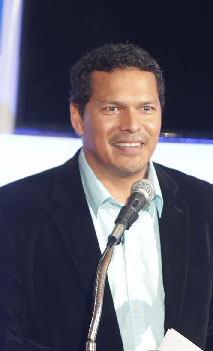Acting Chief Justice Roxane George-Wiltshire SC yesterday ruled that the order signed by former Guyana Elections Commission (GECOM) Chairman James Patterson for the conduct of the national house-to-house registration exercise is neither invalid nor illegal.
Delivering her ruling yesterday afternoon, the Chief Justice stressed that although Patterson’s appointment would later be invalidated by the Caribbean Court of Justice (CCJ), the acts he performed as Chairman were saved by the de facto doctrine.
By way of a fixed date application, Leader of the Liberty and Justice Party Lenox Shuman challenged the validity of the order signed by Patterson for the conduct of the registration exercise.
In addition to losing his challenge, Shuman has been ordered to pay court costs in the sum of $400,000—$200,000 each to GECOM and the Attorney General, against which they action was brought.
Shuman’s case was that since the appointment of Patterson as the GECOM Chairman was found to be void by the CCJ, it effectively also rendered the order made under his hands void.
As a result, he was seeking an order of certiorari to quash the registration order, while contending that the setting of the date was, among other things, unlawful and made in bad faith.
The judge said, however, that having reviewed the case law and relevant legislation guiding the issues raised by Shuman, there was nothing restraining Patterson from issuing the order for commencement of the registration process.
Noting that the de facto doctrine applied, the Chief Justice ruled that the actions taken by Patterson were saved, although his appointment would eventually be invalidated.
The doctrine advances that the acts performed by officers de facto, within the scope of their assumed official authority and in the interest of the public or third parties and not of their own benefit, are valid and binding as if they were officers de jure (by right).
This had been the contention of the Solicitor General Nigel Hawke for the Attorney General, and Roysdale Forde, who represented the GECOM.
However, Shuman’s lawyer, Sanjeev Datadin’s argument had been that since Patterson’s appointment had been invalidated, all the actions he would have taken and decisions he would have made while he sat as Chairman were likewise void and could not be preserved by the de facto doctrine.
On June 18th, the CCJ declared the process used by President David Granger to unilaterally appoint Patterson in October of 2017 as Chairman of the GECOM to have been flawed and unconstitutional.
As a result, Datadin’s position was that the order by Patterson on June 11th for the exercise was made in “bad faith,” and was “unreasonable,” since the challenge to the validity of his appointment was still being heard by the CCJ.
Patterson, who resigned following the ruling of the court, had ordered that the registration exercise commence on July 20th.
Justice George-Wiltshire said that in accordance with the National Registration Act and the Elections Law Amendment Act, there was nothing to suggest that Patterson acted without lawful authority, especially given that the registration process is also provided for by law. She noted, too, that the order issued by Patterson was not one made solely by him but by the Commission, which was also not illegal.
In the circumstances, the judge said that contrary to Shuman’s advancements, Patterson’s announcement of the date for the commencement of the registration could not be held as being unreasonable, void or having been made in bad faith.
On this point, the judge expressed the view, having referenced legislation that the GECOM can conduct house-to-house registration or any other form of verification it deems fit, at a time it so decides.
She, however, noted that the Commission must be cognisant of the “extraordinary circumstances” under which it is currently operating, given the December 21st, 2018 passage of the no-confidence motion against government. The passage of the motion necessitated elections within three months unless the National Assembly by a two-thirds majority granted an extension. The polls have not been held and no extension has been granted by the National Assembly.
Finding Patterson’s order not to have been invalid, Justice George-Wiltshire refused Shuman’s application.
In a comment to the Stabroek News after the ruling, Datadin said he was disappointed with the ruling. He also said he thinks the cost imposed by the Chief Justice to be too high in that it is “much more substantial than ordinarily awarded in the courts in Guyana.” This, he said, would definitely be a deterrent to persons challenging “executive excesses and misbehaviour going on at the moment.”
Just last week, Justice George-Wiltshire ruled that the house-to-house registration exercise presently underway is not unconstitutional after a challenge to its validity by chartered accountant and political commentator Christopher Ram.
In that case, the judge upheld the legality of the exercise but also declared that existing registrants cannot be excised from a new voters’ list unless certain criteria provided by law are met—that being by death or by specified means of disqualification. She also noted then the passage of the motion and the circumstances under which GECOM is operating.






